When people think of planting some fragrant flowers at home, the first plant they can think of is a gorgeous jasmine plant. But what about your four-legged purring fur balls? Is Jasmine Poisonous To Cats?
We love to decorate our garden and home with alluring leafy and flowering plants; why not imagine coming home after a hectic day and seeing shiny green leafy foliage and vibrant flowers waiting for you? I bet all your stress and tiredness will vanish in a snap. But before giving space to your plant in your garden, knowing about the plant is very important, especially if you have young ones or pets at home.
Not all the jasmine flowers are poisonous to cats, especially all the varieties of the Jasminum genus are safe; other flowers are considered jasmine but do not belong to the Jasminum genus, like Yellow Jasmine (( Carolina Jessamine ), Star Jasmine ( Trachelospermum Jasminoides ) Or Coral Jasmine ( Nyctanthes Arbor-tristis ). But I will say keep an eye on your children and pets. Even the non-toxic ones should not be ingested cause it can lead to gastrointestinal upset.
In this article, I will mention some of the popular jasmine plants we plant in our garden, which flowers are considered toxic to cats, and what you must do if they have ingested them and you will get proper information about whether jasmine flowers are edible or not.
Is Jasmine Poisonous To Cats?
Yes Some Of Them Are Toxic Here Are Some Toxic Varieties
Yellow Jasmine
It is a gorgeous flowering vine of South Africa that blooms vibrant yellow flowers and can grow to 20 feet. Yellow jasmine is also known as Carolina Jessamine. It is grown as an ornamental plant in many gardens but is a known toxic climbing vine among plant enthusiasts. It contains neurotoxic alkaloids that can cause paralysis, clonic convulsions, and muscle weakness, and if ingested in high quantities, it can lead to respiratory failure.
As you know, cats are curious animals, so you have to keep an eye on them. They can ingest the pollen of the Carolina jessamine unknowingly, and that can harm them if not treated if they see symptoms like excessive drooling or vomiting. It’s time to get veterinary help.
Night Blooming Jasmine
Night-blooming jasmine, also known as Lady of the Night, belongs to the Cestrum genus and is not a true jasmine. It’s an evergreen shrub with glossy leaves that bloom with a cluster of tiny tubular green-white flowers. All parts of this plant, including its berries, leaves, and flowers, are toxic to cats. It contains an alkaloid toxin called solanine that can cause a rise in body temperature, rapid pulse, excessive drooling, and gastritis.
Crape Jasmine
Crape jasmine is an evergreen shrub that belongs to the Tabernaemontana genus and is also known as a pinwheel flower because it blooms pinwheel-shaped flowers. Crape jasmine can grow 5-6 ft tall and create deep green foliage. Also, after plucking the flower or scratching the bark or leaves, it releases a toxic white latex that causes symptoms like delirium and cardiotoxicity. It can harm your cute little pets like cats and dogs. If you have seen your cat playing around a crape jasmine plant and start witnessing symptoms like muscle weakness and paralysis, then rush to your nearest veterinarian. It can lead to respiratory failure and even seizures.
Pink Jasmine
The fragrant blooms of pink jasmine vine are highly attractive and pleasure both eyes and nose. It’s an evergreen climbing vine that can grow up to 20 feet with proper support. It is also grown as a houseplant, which is why there’s more risk for your pretty cats. Pink jasmine also contains toxic alkaloids; right after ingesting, it shows symptoms like vomiting, drooling, and swollen lips.
Note: You must remember that not all cats are the same; some are resilient over this jasmine, especially the bigger ones, so I suggest keeping an eye on them.
Star Jasmine
Star jasmine is an excellent plant for enhancing the look of your yard or patio. It does not release any hard toxin but releases a sap, which, after ingesting, can irritate the stomach and lead to gastrointestinal problems in cats. If you caught your cat chewing the vines of star jasmine, you have to rethink the plant placement. If you start seeing worse symptoms like diarrhea or vomiting, take them to your nearest vet. Ingesting star jasmine might cause respiratory problems like sneezing.
Arabian Jasmine
It is also known as Jasminum Sambac and is a native small shrub in tropical areas of Asia. It can grow to a height of 1.6 to 9.8 ft. It is cultivated for its alluring and scented flowers. Arabian jasmine flowers are non-toxic for humans because they are used in making jasmine tea. But the leaves of these blooming beauties are toxic to your cats and contain glycosides that trigger problems like vomiting and diarrhea after ingesting. If you see symptoms like a loss of appetite, there might be a chance that your cat has chewed leaves of Sambac jasmine. Remove the plant material from your cat’s mouth as soon as possible and offer some yogurt or milk.
Safe For Cats Jasmine Varieties
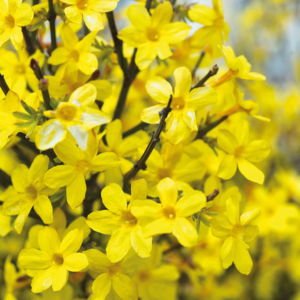
Winter Jasmine
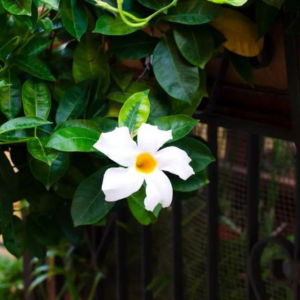
Chilean Jasmine
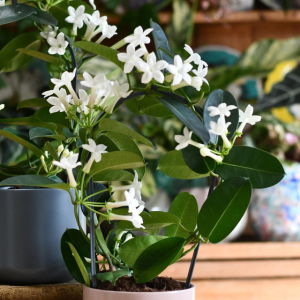
Madagascar Jasmine
Things To Do If Your Furry Friend Is Been Poisoned
When a cat ingests any part of these jasmine plants, you can witness symptoms like –
- Drooling
- Vomiting
- Oral Irritation
- Skin Irritation
- Watery Eyes
- Diarrhea Or Gastrointestinal Upsets
You have to understand the urgency of the Condition and act accordingly, even if the symptoms are not that big. You have to take the veterinarian’s advice.
First Aid You Can Do
Try to remove the material asap from the mouth if you catch your cat in the act while chewing any toxic part of the jasmine plant, but don’t panic; do it only if the cat is on the safer side. Don’t do something so your cat can vomit without talking with your veterinarian.
You take the plant cuttings with you or the vomit of your cat that contains plant material so the vet can act fast.
How to Cat Proof Your Garden
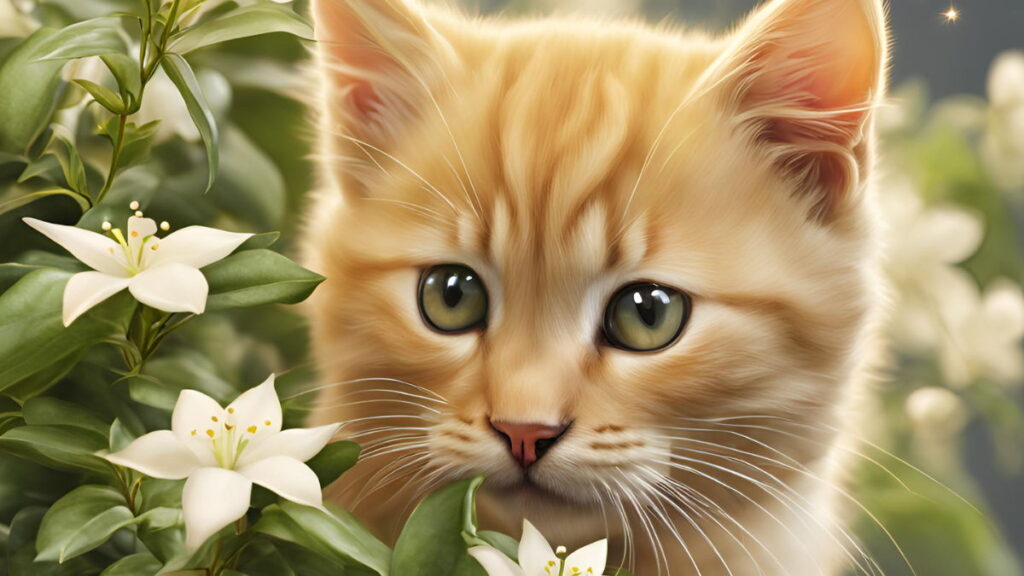
- Cats are inquisitive animals. They want to taste everything, so taking certain precautions is better so they don’t have to use its extra life. You can do fencing around your jasmine plant or install a plant cage if your cat is spending extra time near the jasmine plant.
- You can install motion sensor sprinklers if you are a tech freak and want something that kills two birds with one stone. It will deter your cat from coming near your jasmine plant and give a nice shower to your lovely plant.
- If you have a potted jasmine plant, place it at a height your climber cats can’t reach.
- Suppose you are not obsessed with jasmine flowers. In that case, there are many fantastic options for non-poisonous houseplants, like Areca Palm, Radiator Plant, Prayer Plant, Sword Fer, Spider Plant, and many more.
Final Words
Jasmine is a gorgeous plant that gives both indoor and outdoor spaces a stunning touch, filling the environment with its pleasant, fragrant flower. But some varieties are toxic to your furry friends, and according to ASPCA, those that are considered non-poisonous can cause gastrointestinal problems if ingested.
Some varieties can be grown as shrubs and some as vines, but both are perfect for decorating your garden and are also considered ornamental plants. If you have pets or children at your home, choosing a safer option will always keep you tension-free, and you can enjoy the surreal beauty of your jasmine plant to its fullest.
Is Jasmine pet-friendly?
If you are a jasmine enthusiast and want to add pet-friendly jasmine plants to your home garden, then you might have a question popping into your mind: is jasmine poisonous to cats and dogs? So, White Jasmine, which is Jasminum Officinale, is considered non-poisonous to your dogs and cats.
Does Jasmine attract animals?
No, jasmine flowers do not attract any animals. It is considered a deer-resistant plant, but Dogs and cats are curious animals, and some jasmine varieties, so keeping an eye on them will keep them safer. But jasmine flowers do attract pollinators like bees, hummingbirds, and butterflies.

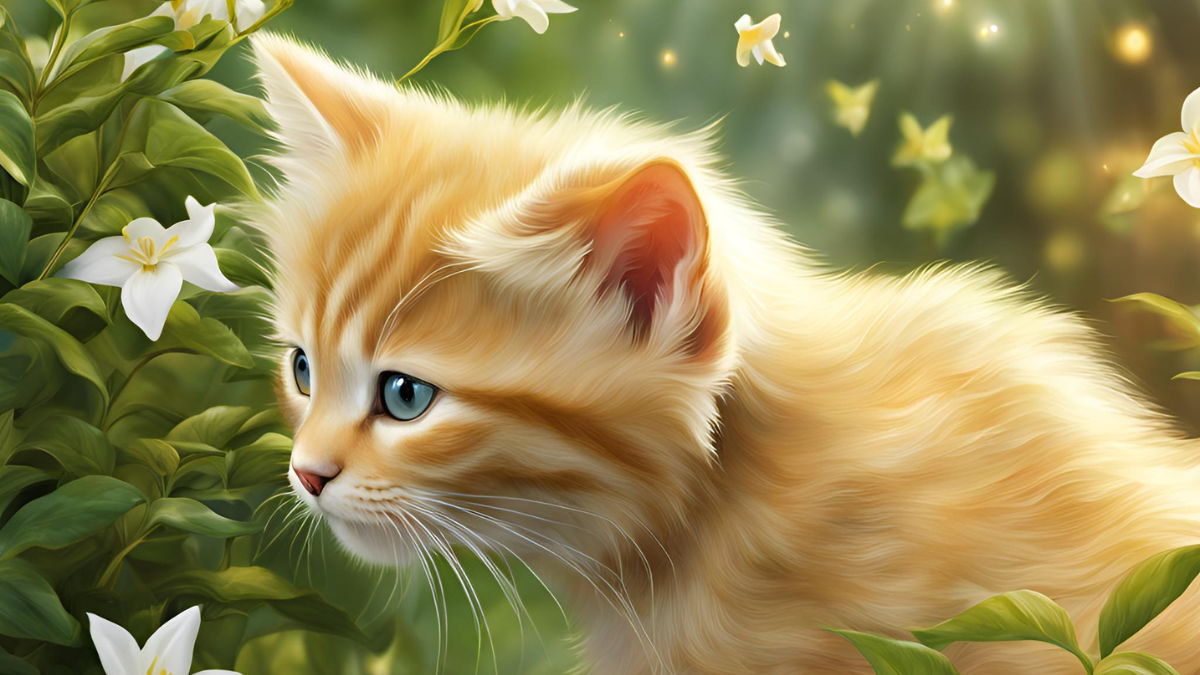
1 thought on “Is Jasmine Poisonous To Cats?”